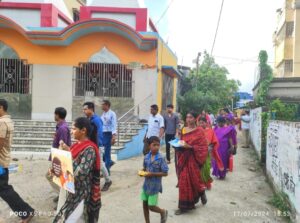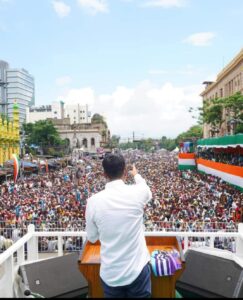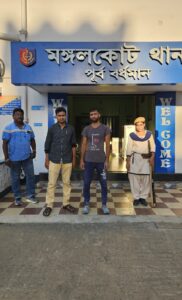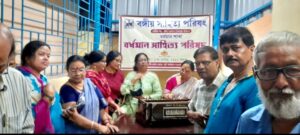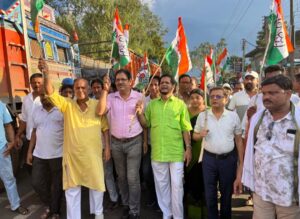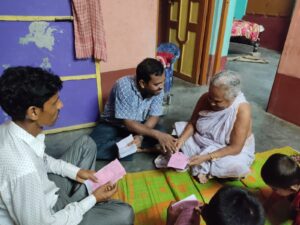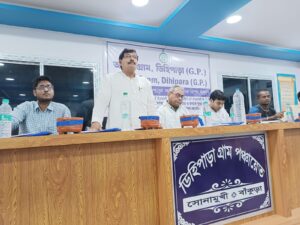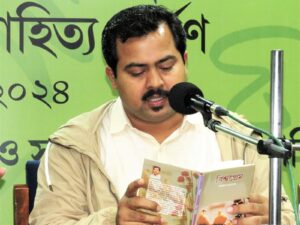Dr. Ratan Bhattacharjee :Through Udar Akash publications Faruque Ahamed versatility is manifested as poet, writer, essayist and above all as a socially alert citizen. It is a passion of the heart. Udar Akash is calling, let the light of literature illuminate every home. Michael Bassey Johnson in The Infinity Sign wrote “Creativity expands the mind, stretches it beyond ordinary human comprehension, resulting in the mind being elastic and capable of transcending and discerning complex ideas.”
Every book fair in Kolkata witnessed his publications. He is a fountain of inspiration to many in the publication world as a ‘pole star of commitment’. Nearly all eminent intellectuals and academicians, poets and writers veer round him for a space in his edited journals and edited books. In the latest Book Fair issue of Udar Akash eminent Akademi awardee writers like Subodh Sarkar and Journalist like Mainul Hassan along with others contributed a good many articles on the socio-cultural life of Bengal and North East, nay India. Subodh Sarkar’s unique poems raise a big question “What is life’s meaning if we forget to dream”. In another poem he wrote “I wanna write like a young poet , I wanna do mistakes”. Side by side, in a serious essay Mainul Hassan wrote on Gulzar’s only novel Do Log which he wrote at the age of 83. The novel was written against the backdrop of World War II. Gulzar mused on the tragic story of Partition. Sumit Mukhopadhyay handled a difficult topic ‘Netaji Subhas Chandra Bose and Shymaprasad Mukherjee : Their Concepts of Nationalism”. The discussion on Nobel Laureate Amartya Sen’s interpretation of John Rawl’s concept of Justice is truly a perceptive one and worth reading. Zahir Ul Islam mused on the sense of humour in the poetry of the revolutionary poet Kazi Nazrul Islam and it makes happy reading. For the collection of such rare articles and poems Udar Akash is regarded as ‘a cultural heritage’ more than a mere edited journal. Faruque Ahamed who hails from a backward community rises to a great height of intellectual commitment by connecting the great minds of Bengal, Assam and even Bangladesh. He focuses on the socio- cultural background of our country and the position of the backward minorities in his books and journals. He traces back the hitherto unknown roots of their sufferings. This is a Herculean task and he continues with it. Recently he published one very important book Bangalir Astitwa Rakshar Sangram (A Struggle for the Existence of the Bengalee) which has stirred the intellectual mind. The book contains more than forty write ups by twenty two eminent writers and researchers including Barid Baran Ghosh, Safiunessa, Bani Basu,
Subodh Sarkar, Mainul Hassan, Jayanta Singha , Suman Bhattacharya, Jayanta Ghoshal, Manisha Bandyopadhyay, Mohd. Samsul Alam, Ekramul Haque Sheikh, Prabir Ghosh Roy, Dipak Saha, Kumaresh Chakraborty and many others. In his poem Subodh Sarkar wrote “Language survives in Salt and Turmeric” . Sahana Nag Chowdury focused on how a language like Bangla fights for its own survival over the ages. Barid Baran Ghosh expresses his concern for the gradual decline of Bengali culture and heritage. Long ago Tagore wrote about the ‘Unity of the nation’ which was forged through the unity of languages. But that too is in jeopardy and Safiunessa expressed her concern in her article about the cleavages found in this unity in Assam and Bengal and also in other parts of the country. In Bengal the existence of Bengalee people is at stake. In Mumbai the Marathi constitutes 68%, in Chennai, Tamil constitutes 82 % Kannad in Bangaluru constitutes 72% but in Kolkata Bengalee are less than 55% of the total population. ‘Is the survival of the Bengalee at stake?” Suman Bhattacharya raises this question in his article.
Faruque Ahamed who is deeply engaged in academic and research activities always made the exploration of the status of neglected backward ethnic groups as a focal point in his undertaken projects. As the Editor of “Udar Akash” magazine and Udar Akash publishing house and a researcher of Kalyani University, he concentrates on working for the dignity of the nation for the welfare of the society, in addressing the grievances of the neglected and backward classes in their time-worn struggle to help them enjoy their due rights. Faruque Ahamed is one of the representatives of Bengal’s new batch of thinkers that emerged in sthe early 21st century. He created a sage niche for himself in the field of social thinking at a rapid pace as one of those rare harbingers of new Dawn who are committed to the promotion of values in keeping with newly emergent ideas and revolutionary theories in the pages of literature. Udar Akash has already left a profound mark on the panorama of literary mind of our times. All great minds love to dream and it is the dream of writer Faruque Ahamed to show the new horizons of progressive thoughts as a new milestone of thinking.
Faruque Ahamed was not born with a silver spoon but his birth on March 7, 1983 in Natapukur village of South 24 Parganas district was probably an auspicious event for the people of Natapukur village which today feels proud of him. He was an inquisitive student in the village primary school with chalk in hand. He is the first in his generation to get an opportunity to work as a Ph.D. researcher in the prestigious Kalyani University. Earlier no other member from the family got a chance to get admission in Ph.D. Faruque Ahamed’s wife Mousumi Biswas is also working as a Ph.D. researcher in the Department of Education. Faruque Ahamed is currently working as News letter In-Charge and Office Co-ordinator of Chemistry Department in Kalyani University.
His notable poetry book is ‘Vishwaprem’. Essay collection ‘Promise and Development’, ‘Furfura Sharif’s Message’, ‘Muslim Vote Bank in Congress and Left Governance’, ‘The Paradox of Sunrise Political Empowerment in the West’, ‘Kazi Nazrul Islam Across the Vast Sky’ and ‘Bengali’s Struggle for Survival’ edited by Faruque Ahamed.
Faruque Ahamed also edited a research book on Kalyani University written in English. “Udar Akash” edited by Faruque Ahamed has already published special issues on ‘Minorities and Chief Ministers’, ‘In Search of Dignity’, ‘Search for Self-Identity’, ‘Mirror of Self-Development’, ‘Backward and Minorities in Political Empowerment’, ‘Degradation of Values’, ‘Awakening of Bhoomiputras’ and ‘Advancing the response to ugliness’. These academic and literary efforts made the people of Bengal aware of the turning point in state politics. He is determined to continue efforts in search for human dignity in the future.
Editing anthology is nowadays a regular thing with the academicians. But when it is the versatile Editor Faruque Ahamed, the story is totally different. His recently edited books tell us the big truth. Everyone knows his peer reviewed Bi-annual Literary Research Journal ‘Udar Akash’ (Generous Firmament). It has crossed nearly twenty two years as the journey started when he published the first issue of “Udar Akash” (in 2002) with the help and cooperation from many of his friends. During his school life, he had his debut in journalism. At that time, he started his career with scanty earning from farming and selling newspapers. More than 121 books have already been published by Udar Akash Publishing House. Several books of high academic standard have been published by Udar Akash publishing house which rightly deserved encomium from researchers and varied readers of West Bengal Assam or even Bangladesh.
Faruque Ahamed said ”Muslims had no contribution in the middle class and intelligentsia of Bengal that flourished in the early 19th century. However, it is universally accepted that the work of unifying all the towns of Bengal under the name of ‘Banga’ was not achieved during the Hindu period. This job was accomplished during the Muslim period.1 This was the most difficult time for the Muslims of Bengal during the six hundred (600) years after the arrival of Muslims in Bangladesh and the beginning of the propagation of Islam through Sufi mystics (bujargs). The period from 1757 (The year when the throne or the ‘Hukumati Takht’ passed from the hands of the Muslims) till the beginning of the 20th century can be characterized as a dark period for the Muslims of Bengal. It is notable that during the Mughal period Muslim Bengali literature continued to be discussed and practiced in Bangladesh and in two independent outlying states outside the Mughal Empire (namely Rosang and Tripura).2 In this context we have to remember the untold sufferings of Muslims in Hindustan after an unsuccessful Sepoy Mutiny in 1857.3 M.R. Akhtar Mukul’s book called “Kolkata-centric intellectuals” (Kolkata kendrik Buddhijibi) supports this statement.
The period between 1905-1947 AD can be identified as the period of self-establishment and expansion of the middle-class Bengali Muslim class. 4 That is, since the beginning of the twentieth century, Bengali Muslims had been trying to find a form of society. In fact, between 1920 and 1947, it emerged as a prestigious ethnic group. A mindset of response to change is developed at every level of life. At such a time, independence came to this subcontinent through partition. Bengali Muslim’s self-development path soon became blocked in Bengal.
A large section of the newly emerged Bengali Muslim intellectuals ‘migrated’ to the then East Pakistan seeking respect and establishment. As a result of the political evolution in the life of the Muslims of West Bengal, an indescribable misery descended. Then in Calcutta, the loss of life and property of Muslims was much more than that of Hindus. After the partition of the country, the Bengali Muslim society suddenly became guardian less. The political ideas of individual nationality, right to self-determination had disappeared over time in changed circumstances.
In such a situation, the intellectual field of Bengali Muslims was disturbed, though it was natural. Humayun Kabir (1906-’69), Qazi Abdul Odud (1894-1970), Syed Mujtaba Ali (1904-’74), Abu Syed Ayub (1906-’82) and Rezaul Karim (1902-’93). The people mentioned earlier in the country-division achieved special fame in the practice of literary culture. At this time a group of Bengali Muslim writers took initiative. Two literary organizations were established for that purpose. One was in Calcutta and the other was in Dhaka.6 The associations for Islamic Civilization and Cultural Aspects were saved by hard works of M. Abdur Rahman.
The void created in the field of literature and culture after the partition shocked the Muslims of West Bengal, but they did not lose heart. At this time, the principles of Renaissance Society and Sahitya Sangsad were adopted in the field of literature and culture. This principle was particularly noticeable in the use of the Bengali language.7 It’s manifestation had become noticeable later. The names of Syed Mustafa Siraj, Abdul Aziz Al-Aman and Abdul Jabbar are particularly memorable amongst the promising young Muslim writers of that time. After partition, when the cultural identity of the Bengali Muslim society had in danger, at that time Syed Mustafa Siraj had overcame various disasters and limitations to establish his dignity and nobility, at the same time, Bengali Muslims had tried to identify the centre of their self-esteem. Mr. Syed Mustafa Siraj was the top representative of ‘Composite Culture’. At this time, the Bengali Muslim writer’s eyes were particularly focused on his social and communal feelings. In this regard, the role of Muslim writers against social prejudices was memorable.8 Especially their efforts in modern education, gaining freedom, connecting with science and modern lifestyle were helpful in the progression of society.”
[Dr Ratan Bhattacharjee an International Visiting Faculty USA and a multilingual writer may be reached at [email protected]]





